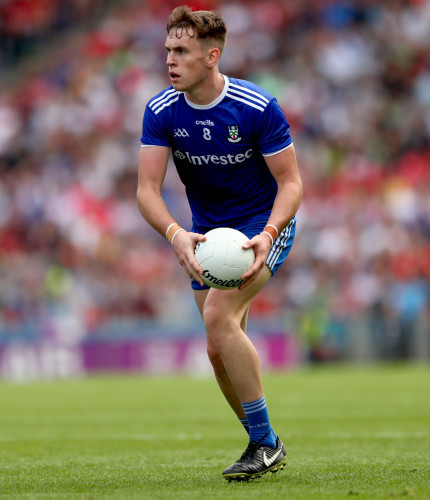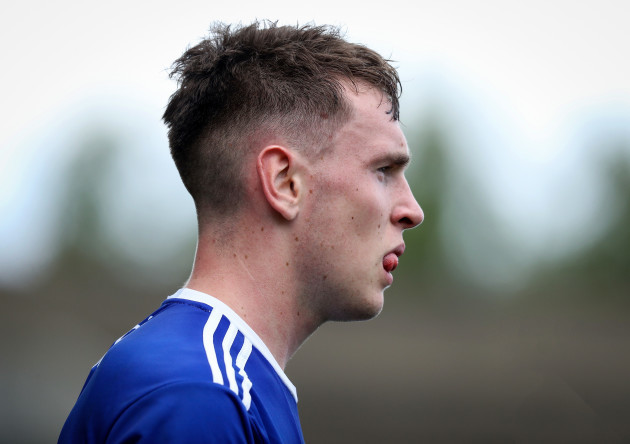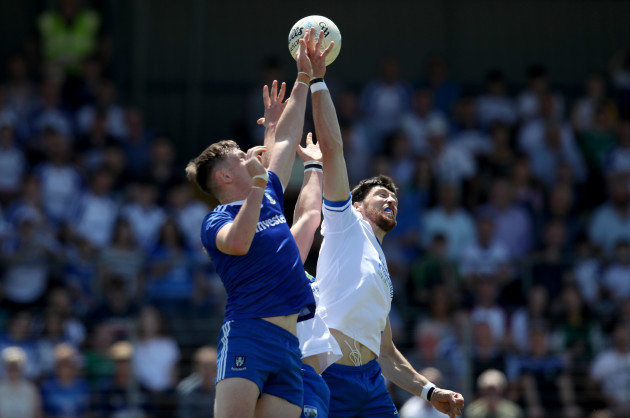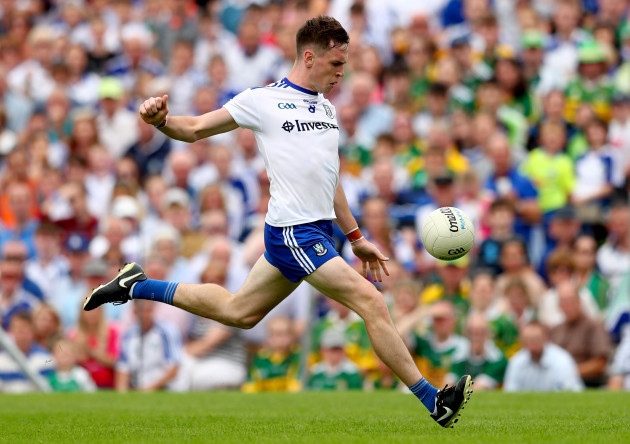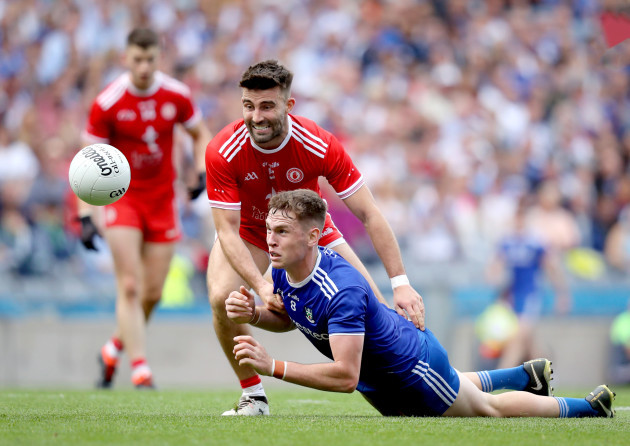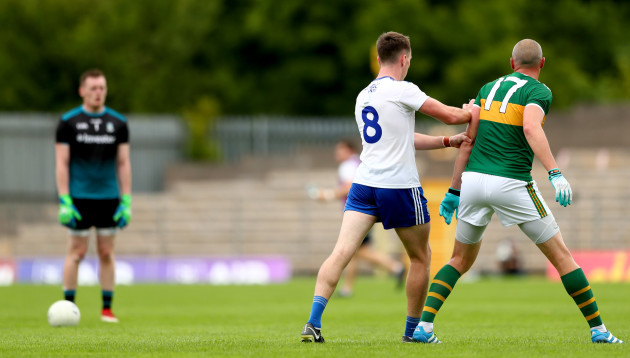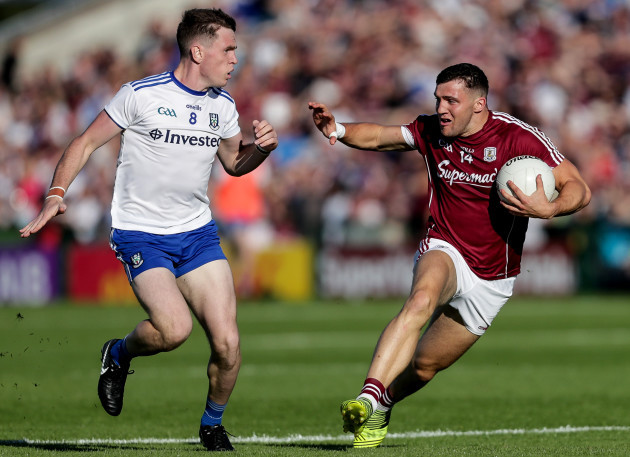WHAT WAS RUNNING through your mind before you underwent open-heart surgery?
It’s not the sort of question you can typically put to an inter-county player.
Last October, Monaghan’s young midfielder Niall Kearns endured “six or seven” hours of surgery to repair a leaking valve in his heart.
It arrived on the back of a sensational debut season for the 21-year-old, who earned an All-Star nomination for his role in Monaghan’s trip to their first All-Ireland semi-final in 30 years.
On 12 August, he was part of the Farney side that agonisingly missed out on a place in the All-Ireland final, falling to Tyrone by a single point in Croke Park.
Exactly two months later, on 12 October, Kearns was sitting up on a bed in the nearby Mater Hospital, being readied to go under the knife by doctors and not knowing what to expect.
“I went down at about 10am and they prepped me for surgery,” he tells The42.
“I was grand until they called me and then the nerves probably started kicking in a wee bit. But it wasn’t the worst. My family were there with me and they walked me down the hall to the surgery.
“The doctor on the team was like, ‘You’re going to be hit by a bus here’.
“And I was like, ‘Ah yeah, yeah.’
I didn’t really pass much remarks on it. I didn’t really know what to expect. So I actually wasn’t too bad going for the surgery. I found out after. When I actually had the surgery I knew what he was talking about when he said I’d be hit by a bus.”
The issue was a leaking valve in his heart. Doctors discovered the problem when he was 16 and he was put on medication to prevent the valve from expanding further. It didn’t affect Kearns much in his day-to-day life.
“They said it was fine and I didn’t need surgery up until a certain point,” he explains. “They said up until it got so wide, they were going to have to operate.
“I was on medication for that to try and prolong that for as long as I could, to protect the valve. It just didn’t really work so I had to go for the surgery then.
“They were monitoring it for that period of time until it got to a stage where it was too big and was leaking too much. It was just time to get it done and that was probably the best time to get it done.”
Over the last year, the pains in his chest started.
It started getting worse and worse. The chest pains would come more often.
“They would have been fairly sore, probably a six or seven (on the pain scale). They were sore enough coming to the time I was going to get the surgery. And they were coming more often.
“They’d only last a minute or two and then they’d go away and you mightn’t get them for a week, you mightn’t get them for two or three weeks. It wasn’t really anything I was doing that was giving me them pains either.
You could be walking, you could be running and you’d get them pains.”
It happened to coincide with his first year as a starter on the Farney team under Malachy O’Rourke, although Kearns says it wasn’t directly related to the extra stress placed on his body by inter-county football.
“Not really. It probably did in its own way, to a level. But I wouldn’t have found it hurt when I was playing or anything like that. You wouldn’t know when the pains would come.
“It wasn’t necessarily that the football was putting pressure on it. It probably did to a certain degree but not significantly.”
The procedure involved surgeons attempting to save the original valve. When it wouldn’t fit back in, “they had to get their own graft and put it in.”
At around 7pm, a groggy Kearns returned to the intensive care unit to begin his long road to recovery. It’s common for patients to experience a wide range of emotions, including depression, in the hazy fog that follows heart surgery.
“When I came back out I was still on medication so I didn’t really feel too bad until I was back up in the ward. Just different things would catch you – breathing and stuff like that.
“It was tough now for the first while,” he says.
“I definitely felt a lot of emotions coming out of it. Most of the time I always had someone there with me. One of my family would have been there the whole time and it was good they were able to be there the whole time.
“But you’d definitely notice within a week in recovery how much you’ve improved.”
Not long after, Kearns was recovering back at home, but the early days were a slog.
The first four weeks was the toughest. The easiest things like lifting a kettle of water, I wasn’t able to do that. I was only restricted to lifting 1kg.
“Even coughing or sneezing, anything that was putting pressure on the bone was probably the worst of it all. But a week on you’d know a crazy difference in how you’re coming along.”
Still, in early November he felt well enough to attend the PwC All-Star awards, where he was one of seven Monaghan players to be nominated for the honour. While the pain of their near-miss against Tyrone still lingered, the All-Stars gave Kearns the opportunity to reflect on his stunning rookie campaign.
Heading into 2018, he was an unknown entity on the national scene. He’d spent the majority of 2017, his last year at U21, on the fringes of the senior squad, learning his trade. Soaking in what it meant to be an inter-county footballer.
“I was only after coming in and I got very little game-time. I was happy enough to see the whole set-up and understand different things in my first year of being in on a county panel. It was good to see the life off the field and then life on the field and then you’re able to compare the two of them together. I enjoyed last year greatly.
“Looking back, it was one of the best years I’ve experienced. I didn’t expect it at all.”
After taking his chance in the McKenna Cup, Kearns was a revelation at midfield for Monaghan. The Sean McDermott’s man started every single game in the league and championship in his breakthrough season.
He played a full 70 minutes in all but one of Monaghan’s nine championship games in the summer. The only game Kearns didn’t complete was their 0-16 to 0-8 win in Galway, when he was replaced after 62 minutes with the visitors already assured of victory.
Malachy gave me a chance in the first McKenna Cup game. He gave me that chance and Darren Hughes was there beside me, he was able to guide me the whole way through it.
“I looked up to him and he was able to help me through the whole thing so that just made it that bit easier when you’re playing with boys like him and Rory Beggan. He’s just a top-class keeper. It makes it a whole lot easier for making runs and stuff like that.”
Kearns recalls the week of his championship debut in May, when Tyrone welcomed Monaghan into the cauldron of Omagh.
“It was crazy. The nerves that week was mad. You’re just running plays through your head the whole time. It was very, very nervewracking.
“But once the ball is thrown up you just have to let all them nerves go and just play. You’re in the moment so you have to get on with things. It was a great experience to be fair. I enjoyed it too.”
They took care of Tyrone in the Ulster quarter-final, but were stunned by Fermanagh in the last four after a late fisted Eoin Donnelly goal. That sent Monaghan packing to the qualifiers, but it did allow them build-up a head of steam with regular games.
Wins over Waterford, Leitrim and Laois followed to seal a place in the inaugural Super 8s. Kearns found his scoring touch during the run through the backdoor, posting 0-3 before he added a score against both Kildare and Kerry in the All-Ireland quarter-final group phase.
“You sort of set goals out at the start of the game on what you want to achieve in a game,” he explains.
That would be one of my goals, to maybe get on the scoresheet or things like break so many balls – in midfield that’s one of the main things you look to do to break possession up and get turnovers and stuff like that, just disrupting play.
“That’s one of key things you need to be able to play at that level, it’s to be able to compete in the air.
“It’s just something I’d run through the night before. Lying up, you’d just think about what you want to do in the game. Then afterwards if you look back and see that you’d achieved your goals then you’ve done something right.”
Great score by Monaghan's Niall Kearns! pic.twitter.com/ZAEgaVTJPN
— The GAA (@officialgaa) July 15, 2018
A late David Clifford goal denied Monaghan a historic win over the Kingdom, but a draw – and more importantly a big performance – against All-Ireland contenders at the end of July was a sure sign O’Rourke’s men were on the right track.
“For it to be in Clones as well, Clones is one of the best places to play a match. The atmosphere in Clones alone, you just have to take it in.
“We were disheartened at the end when Clifford drew the game, but you just have to get on with things like that too. You can’t be looking back, you just have to take every game as it is really.”
A week later arrived what Kearns describes as his personal highlight from the year. A do-or-die clash against the Connacht champions with a first semi-final appearance since 1988 at stake.
“It was a game that we had to win and every man just performed to their best that day,” he says.
“It was a brilliant day, the weather was great, the atmosphere down there was great and the supporters travelled. It was probably one of the highlights of the year to be fair.”
The Tyrone defeat in the semi-final, having beaten them twice already that year, was a crushing blow.
That was probably the low-point. To be just coming back at them and then being killed by that goal, we didn’t play probably to the best of what we can play that day and we still put it up to them.
“You can take a positive away from that too. Hopefully now this year we’ll get back at it again and hopefully reach as far as we can.”
The Farney find themselves mired in a battle to retain their Division 1 status this spring and there isn’t a whole lot Kearns can do about it. He admits “it’s tough watching from the line” but doctor’s orders must be heeded given the serious nature of his condition.
After taking some time away from the squad, the DKIT student is back among the group and taking part in his own sessions at the Monaghan GAA training base in Cloghan.
Malachy gave me the time that I needed and I was very thankful for that. I am back in around doing my own wee bits and pieces. I just felt I needed to be around to keep interested and know what’s going on.
“The game is progressing the whole time so it changes from year to year. It’s easier coming back in knowing what’s going on rather than being out for two or three months and then trying to come back in. Even building morale and stuff like that with a few new players coming up, you just have to keep in with things.
“I came back and I’m starting to get back doing my own wee bits now. Just doing a bit of training on my own and sessions down in Cloghan.”
No timeline has been placed on his potential return yet.
“I’m doing a bit of running and some small gym work. I’m only allowed to lift so much weight because you can’t put so much pressure on the chest. It’s just slow, very slow now. You have to obey what the doctors and surgeons say.
“I’d say I’ll still be going to the Mater for visits every year or two years. But hopefully when I get back that’ll be me. At the minute, it’s the breastbone that’s the main concern. The valve itself they said it’s healed or on its way anyway.
“It’s not like any other injury where you think you’ll be back ‘next week or whatever’. It’s one of them things you just have to wait and see what takes place.
“I’m just sort of taking it week by week. You don’t know what could happen because I don’t want to rush back into it too quick either or it’ll just bite you in the ass then again. Hopefully not.
“It’s hard to tell, I’m sort of just going by what the doctors and physios say. It’s not something I can really put a date on either. You have to listen to them too. They know what they’re talking about.”
Asked if this spell out of action will give him a greater appreciation of the game when he returns, Kearns maintains that even during his meteoric rise with Monaghan, he never lost sight of what drew him to football in the first place.
“One thing, before I was even on the Monaghan panel, I always enjoyed it. I always enjoyed going out and playing.
“I never really expected much of myself to be called in (to the squad). So I do enjoy every game that I go out and play.
“I think you have to enjoy a game to play it to your full potential too.”
Subscribe to our new podcast, The42 Rugby Weekly, here:
